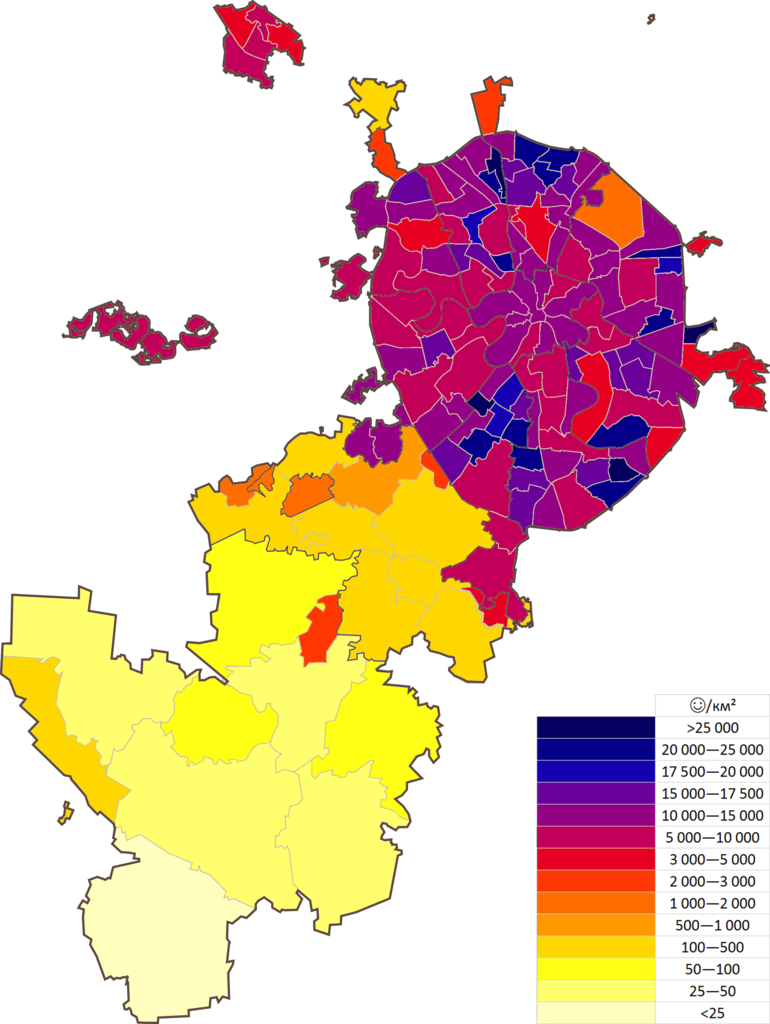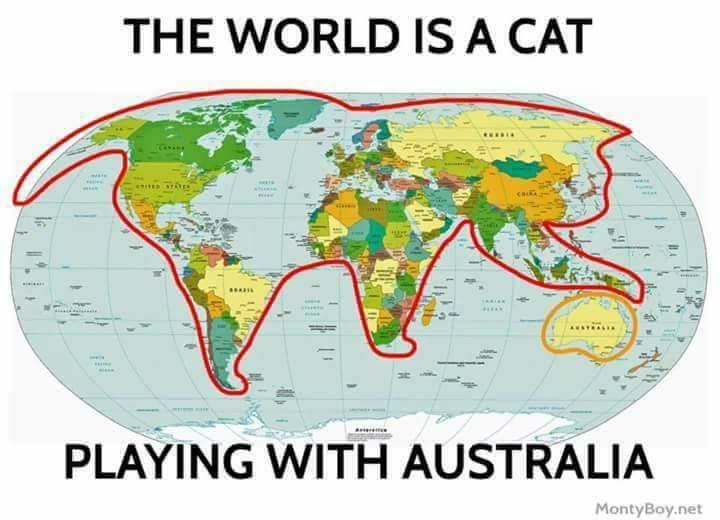
Many people at least once had a need to quickly draw a map of a city or country, putting their data on it (points, routes, heat maps, etc.).
How to quickly solve such a problem, where to get a map of a city or country for drawing - in the detailed instructions under the cut.
Introduction
(, , ) .
, :
, , , , ( , / / ).
, .shp geopandas.
, :
- —
- "1"
- ,
, , , .
Shapefile.
, Shapefile — , (, ), (, ).
, :
- —
- — ,
- — , \
OpenStreetMap ( OSM). , — , .
, . OSM.
OSM, ( , ).
NextGis, , .
— , ( ) ( / ).
OpenStreetMap. , .
, , , , "".
, . , , , .
, ( "").
, , , !
Geopandas, Pandas, Matplotlib Numpy.
Geopandas pip Windows , conda install geopandas .
import pandas as pd
import numpy as np
import geopandas as gpd
from matplotlib import pyplot as pltShapefile
zip .
data . , ( .shp) ( .cpg, .dbf, .prj, .shx).
, geopandas:
# data
# zip-
ZIP_PATH = 'zip://C:/Users/.../Moscow.zip!data/'
# shp
LAYERS_DICT = {
'boundary_L2': 'boundary-polygon-lvl2.shp', #
'boundary_L4': 'boundary-polygon-lvl4.shp',
'boundary_L5': 'boundary-polygon-lvl5.shp',
'boundary_L8': 'boundary-polygon-lvl8.shp',
'building_point': 'building-point.shp', # ,
'building_poly': 'building-polygon.shp' # ,
}
#
i = 0
for layer in LAYERS_DICT.keys():
path_to_layer = ZIP_PATH + LAYERS_DICT[layer]
if layer[:8]=='boundary':
encoding = 'cp1251'
else:
encoding = 'utf-8'
globals()[layer] = gpd.read_file(path_to_layer, encoding=encoding)
i+=1
print(f'[{i}/{len(LAYERS_DICT)}] LOADED {layer} WITH ENCODING {encoding}'):
[1/6] LOADED boundary_L2 WITH ENCODING cp1251
[2/6] LOADED boundary_L4 WITH ENCODING cp1251
[3/6] LOADED boundary_L5 WITH ENCODING cp1251
[4/6] LOADED boundary_L8 WITH ENCODING cp1251
[5/6] LOADED building_point WITH ENCODING utf-8
[6/6] LOADED building_poly WITH ENCODING utf-8GeoDataFrame, . :
fig, (ax1, ax2, ax3, ax4) = plt.subplots(1, 4, figsize=(15,15))
boundary_L2.plot(ax=ax1, color='white', edgecolor='black')
boundary_L4.plot(ax=ax2, color='white', edgecolor='black')
boundary_L5.plot(ax=ax3, color='white', edgecolor='black')
boundary_L8.plot(ax=ax4, color='white', edgecolor='black'):

. - , .
building_poly.plot(figsize=(10,10))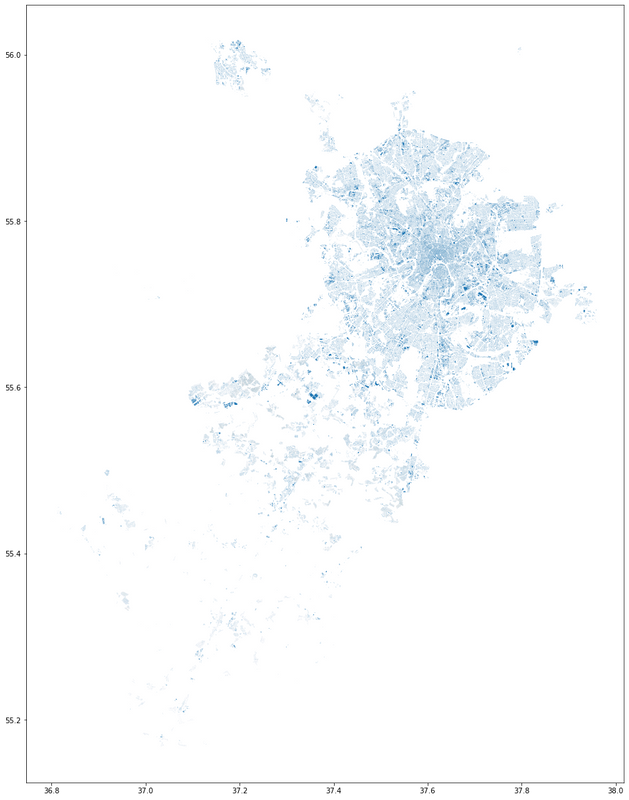
:
base = boundary_L2.plot(color='white', alpha=.8, edgecolor='black', figsize=(50,50))
boundary_L8.plot(ax=base, color='white', edgecolor='red', zorder=-1)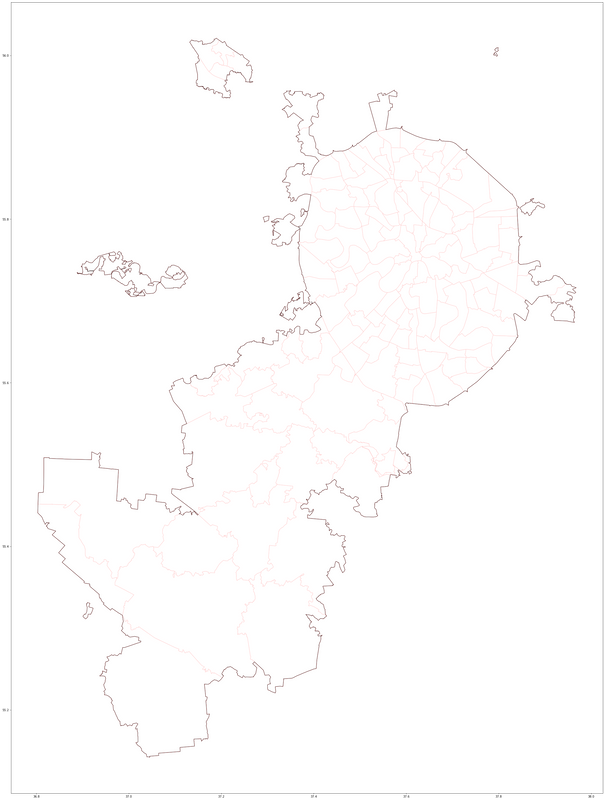
, Geopandas Pandas. , (, ), , .
boundary_L8.head()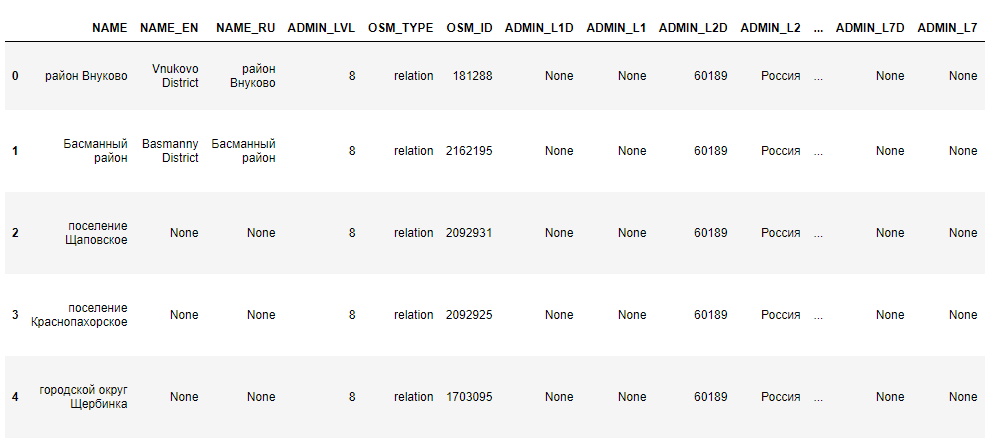
2:
- OSM_ID — OpenStreetMap
- geometry —
.
, , :
print('POLYGONS')
print('# buildings total', building_poly.shape[0])
building_poly = building_poly.loc[building_poly['A_PSTCD'].notna()]
print('# buildings with postcodes', building_poly.shape[0])
print('\nPOINTS')
print('# buildings total', building_point.shape[0])
building_point = building_point.loc[building_point['A_PSTCD'].notna()]
print('# buildings with postcodes', building_point.shape[0]):
POLYGONS
# buildings total 241511
# buildings with postcodes 13198
POINTS
# buildings total 1253
# buildings with postcodes 4, , ( , 5%, 13 ).
:
- OSM-ID ,
- , "" . , , .
%%time
building_areas = gpd.GeoDataFrame(building_poly[['A_PSTCD', 'geometry']])
building_areas['area'] = 'NF'
# ,
# , .centroid.
# ,
for area in boundary_L8['OSM_ID']:
area_geo = boundary_L8.loc[boundary_L8['OSM_ID']==area, 'geometry'].iloc[0]
nf_buildings = building_areas['area']=='NF' # ,
building_areas.loc[nf_buildings, 'area'] = np.where(building_areas.loc[nf_buildings, 'geometry'].centroid.within(area_geo), area, 'NF')
# , , - .
# , .
codes_pivot = pd.pivot_table(building_areas,
index='A_PSTCD',
columns='area',
values='geometry',
aggfunc=np.count_nonzero)
# ,
codes_pivot['main_area'] = codes_pivot.idxmax(axis=1)
# ""
for pst_code in codes_pivot.index:
main_area = codes_pivot.loc[codes_pivot.index==pst_code, 'main_area']
share = codes_pivot.loc[codes_pivot.index==pst_code, main_area].iloc[0,0] / codes_pivot.loc[codes_pivot.index==pst_code].sum(axis=1)*100
codes_pivot.loc[codes_pivot.index==pst_code, 'share_in_main_area'] = int(share)
#
codes_pivot = codes_pivot.loc[:, ['main_area', 'share_in_main_area']].fillna(0) :
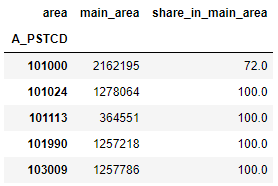
, , , , ( , ).
: "1".
# -
codes_pivot['count_1'] = codes_pivot.index.str.count('1')
#
areas_pivot = pd.pivot_table(codes_pivot, index='main_area', values='count_1', aggfunc=np.mean)
areas_pivot.index = areas_pivot.index.astype('int64')
#
boundary_L8_w_count = boundary_L8.merge(areas_pivot, how='left', left_on='OSM_ID', right_index=True)
#
boundary_L8_w_count.plot(column='count_1', legend=True, figsize=(10,10)):
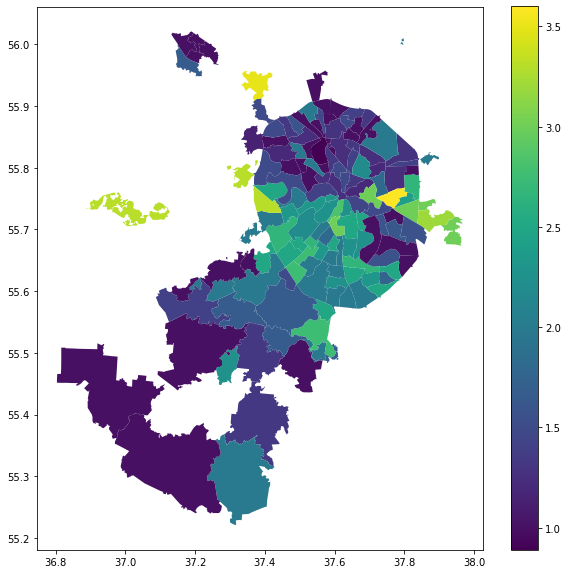
, — ,
, , , .
— share_in_main_area
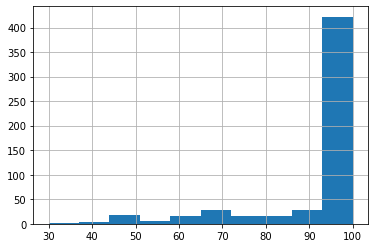
, "" :
codes_pivot[codes_pivot['share_in_main_area']>50].shape[0]/codes_pivot.shape[0]:
0.9568345323741008.
Geopandas — . Matplotlib Pandas .
OSM — , .
, !
— .
